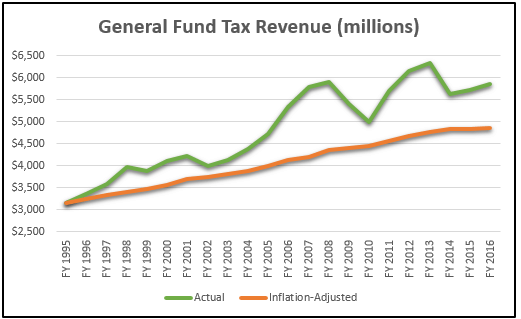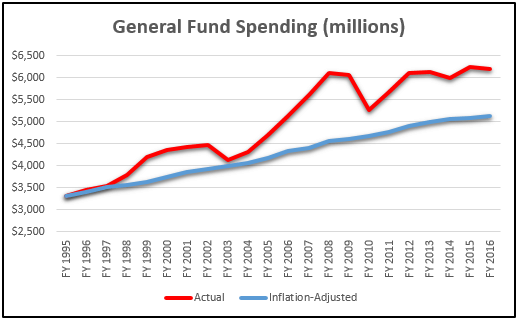Government efforts to justify higher taxes while already spending more than necessary to provide essential services amounts to a direct assault on individuals’ economic freedom, and that’s what the Kansas Association of School Boards did last week. The first installment of their three-part series attempted to make the case that Kansas’ personal income is growing slower than the national average, which they believes proves that tax reform didn’t work and is therefore justification for a large tax increase (so they get their cut). Think about that; they say personal income is sluggish, and their solution is to make it worse with higher taxes!
The second installment of their series poses that Kansas tax revenue has not kept up with the growth in personal income, which they believe means taxes should be increased so they get more to spend. They ignore the fact that local school boards routinely choose to spend more than necessary, oppose common sense efficiency measures, and don’t even spend all of the aid they already receive. just believe they are entitled to more of your money.
They claim that personal income measures ”…how much people can spend, save and invest” but that’s patently false. The government definition of personal income includes several amounts that don’t show in people’s pay checks and therefore aren’t available to be taxed, including employer contributions for retirement and medical insurance, and even Medicaid and Medicare payments!
Comparing tax revenue to inflation, however, shows that government has been doing very nicely. Even after tax reform allowed citizens to keep more of their hard-earned money, General Fund tax revenue for FY 2016 was $860 million more than if it had been increased for inflation since FY 1995. And even that presumes that FY 1995 tax revenue was only enough to efficiently provide services, so the real excess taxation is far greater than $860 million.

The gap between inflation and General Fund spending is even greater. Spending last year was $1.068 billion more than if it had been increased for inflation since FY 1995. Revenue has been growing quite well over time but just not enough to keep up with runaway spending. Indeed, the most recent data shows that Kansas budgeted to spend 34 percent more resident in 2015 than the states without an income tax. Every state provides the same basic services, but those that do so at better prices can offer lower taxes to citizens.
 For more discussion refuting the KASB entitlement pitch, see Dave Trabert’s piece on personal income, and stay tuned for David Dorsey’s piece on school funding coming tomorrow. Additional information on General Fund Tax Revenue and General Fund spending is available on KansasOpenGov.org, with links to government sites.
For more discussion refuting the KASB entitlement pitch, see Dave Trabert’s piece on personal income, and stay tuned for David Dorsey’s piece on school funding coming tomorrow. Additional information on General Fund Tax Revenue and General Fund spending is available on KansasOpenGov.org, with links to government sites.




